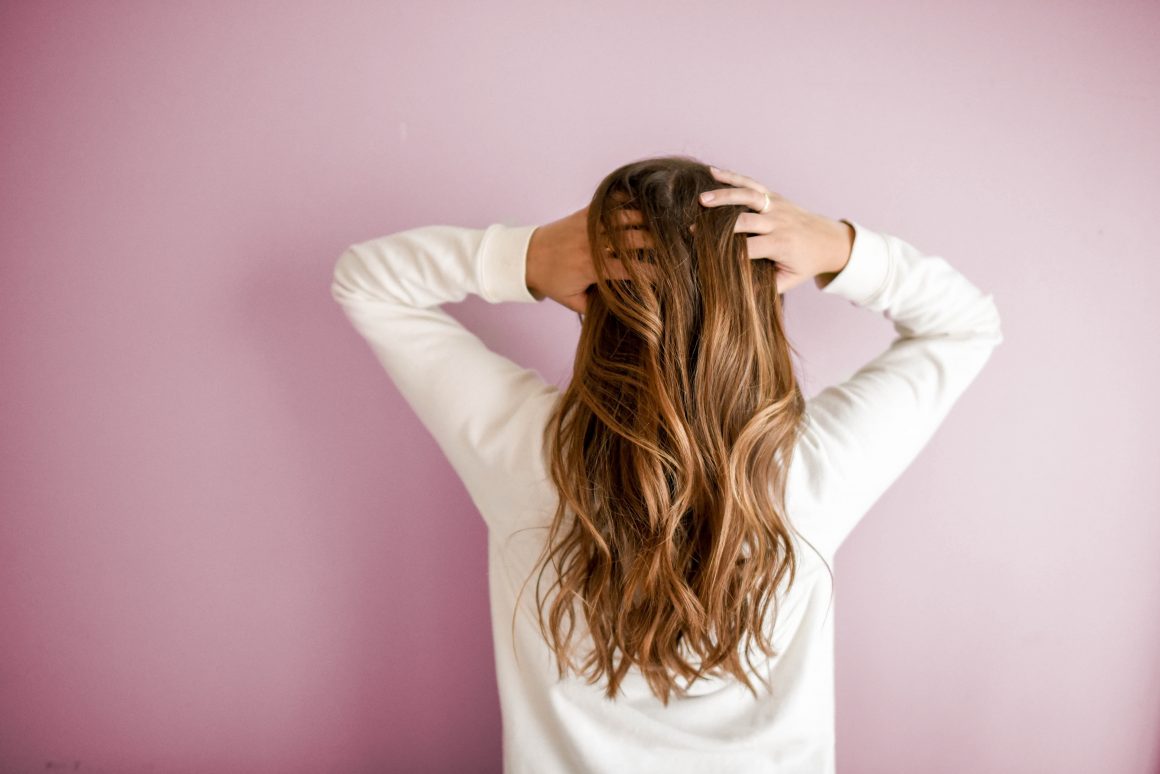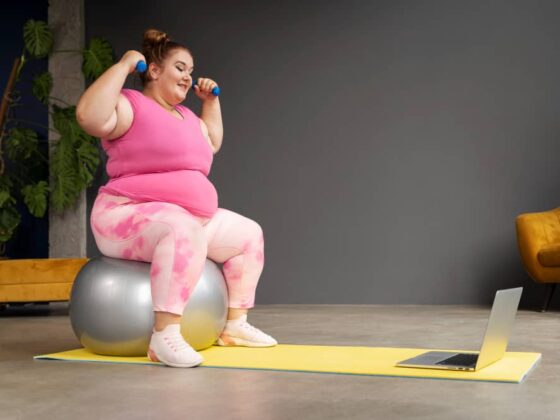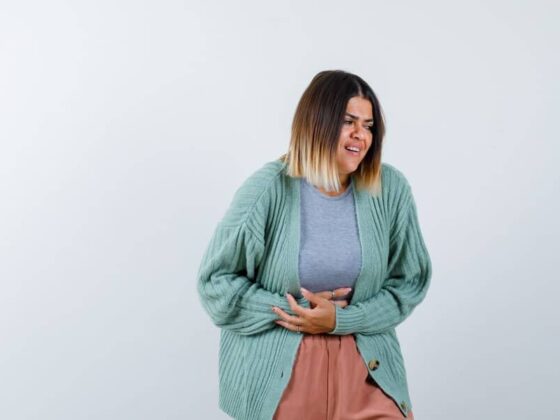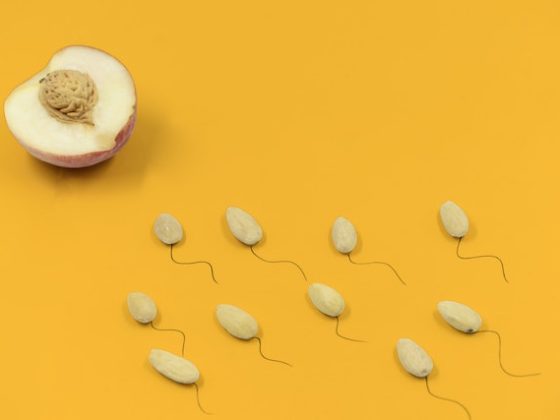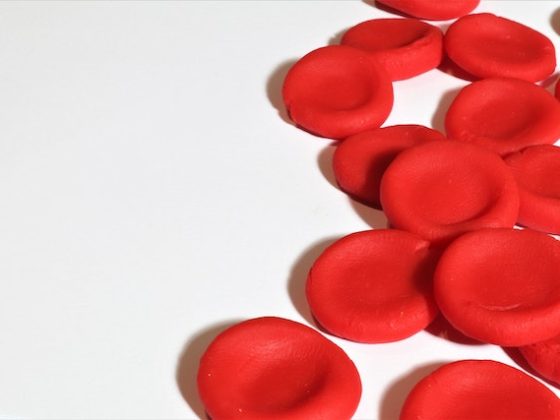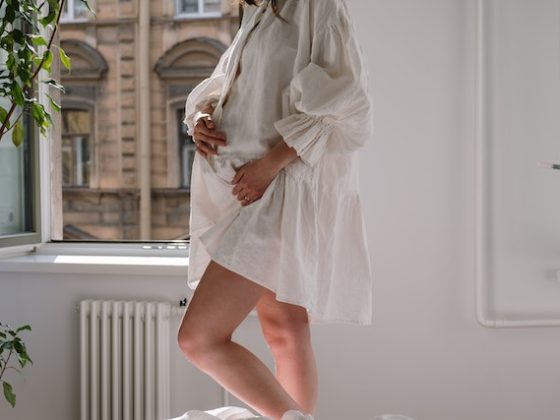Hey there! This post may contain affiliate links. As an Amazon Associate, I earn a teensy commission from qualifying purchases when you buy through these links (at no additional cost to you). For more info, please check the full disclaimer.
Can iron deficiency cause hair loss in women? If you suddenly started losing hair in bulk, it’s probably a symptom of iron deficiency hair loss, also known as Female Pattern Hair Loss (FPHL) or Alopecia.
Recent statistics show that almost 70% of women have iron deficiency, of which 50% are pregnant.
Shocking!
Needless to say, iron deficit is one of the most common problems in women.
But why do you need iron for hair growth? What are the signs of hair fall from iron deficiency? And is it possible to regrow your lost hair?
Today, I’ll answer all these questions and more. You’ll learn about the connection between iron deficiency hair loss and how to reverse iron deficiency hair loss.
#womenshealth #nutrition
What is Iron Deficiency?
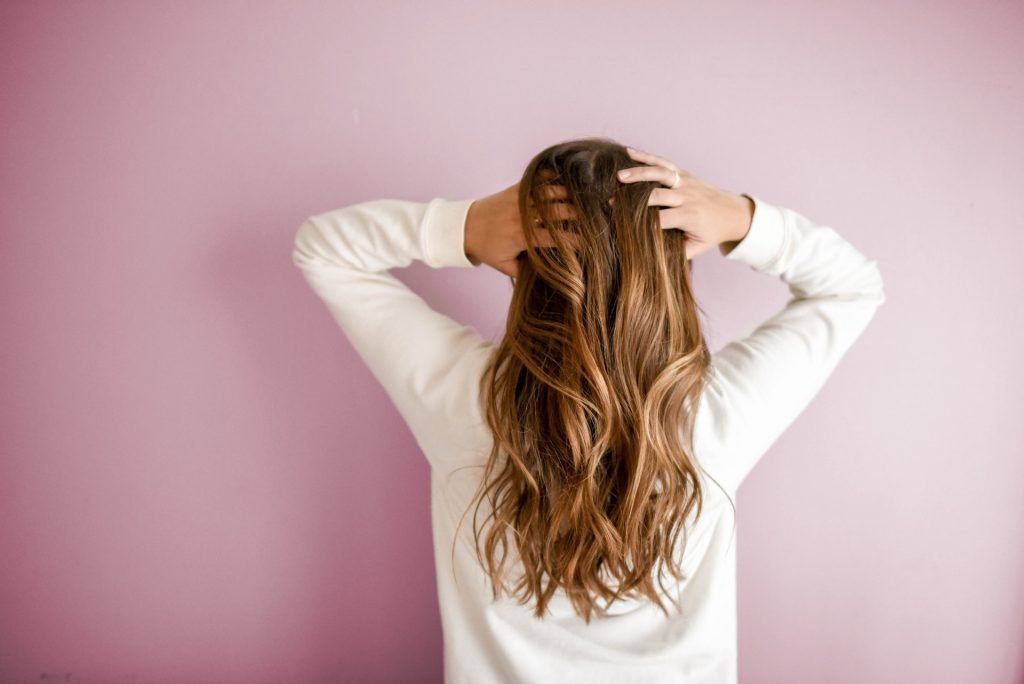
Mineral iron produces fresh blood. About 70% of the body’s iron is carried in a protein called hemoglobin, found in the red blood cells.
Iron deficiency causes a shortage of this integral mineral iron. If not treated on time, it might lead to serious health risks. One of those life-threatening conditions is iron deficiency anemia.
Long-term nutritional deficit poses numerous “hidden” symptoms that are often overlooked — including iron deficiency hair loss.
What Causes Low Iron Levels?
To prevent hair loss from iron deficiency, you should first know what causes this issue.
Let’s go over the most reasons behind low iron levels in women.
- Not eating enough veggies: Eat your leafy green vegetables — just like Popeye! Not to fight off your arch-nemesis but to get the recommended dose of iron. Reduced veggies intake is among the leading causes of iron deficiency anemia in women.
- Dietary lifestyle: Meat is the best source of iron. But if you’re a vegan or vegetarian, you might experience iron deficiency hair loss. I’d suggest discussing ideal alternatives to iron with a dietician.
- Low Vitamin C intake: Citrus fruits contain tons of Vitamin C, which ensures active absorption of iron from food sources. Eating fruits with iron-rich veggies gives your body a remarkable iron boost!
- Smoking: Tobacco prevents natural iron absorption from foods. Additionally, it’s known to mess up your menstrual cycles and cause heavy bleeding. Eventually, this causes iron deficiency.
- Heavy periods: Many women with heavy periods or menorrhagia might also suffer alopecia because of iron deficiency.
- Drugs: Many anti-inflammatory and antibiotic meds are linked to iron deficiency anemia. So if you frequently take these drugs and are losing your hair, it could be a reason for iron deficiency hair loss.
Read More: 100 Best Iron Rich Foods You Should Eat for Iron Deficiency Anemia
How Do You Know If You’ve Low Iron Levels?
Besides a sudden dramatic hair loss, iron deficiency symptoms are mostly unrecognizable in the beginning.
Let’s go over the subtle signs of iron deficiency that you might notice over time.
- Painless bluish-purple bruises on thighs, legs, or arms
- Feeling cold all the time
- Difficulty in breathing properly
- Pale skin because of reduced RBCs
- Brittle nails that break off easily
- Nausea and frequent need to throw up
- Pregnancy complications
What Are The Causes of Iron Deficiency Hair Loss?
So what causes iron deficiency hair loss?
Your scalp contains around 100,000 hair follicles. The hair cells need sufficient nutrients to ensure proper hair growth. All necessary minerals are delivered to the hair follicles through the blood.
Because of iron deficiency, this process slows down. Lack of fresh blood stops nutrients delivery to the hair cells. As a result, you’ll experience rapid hair fall.
Although most skin and scalp conditions are usually a result of some underlying nutritional deficits, not all women with low iron suffer hair fall.
To be on the safe side, however, it’s always worth getting your iron levels checked.
And here’s the good news.
Iron deficiency hair loss is reversible. That’s because the lack of iron doesn’t permanently scar the follicles.
So if you take proper precautions and boost your iron intake, you can easily regrow the lost hair.
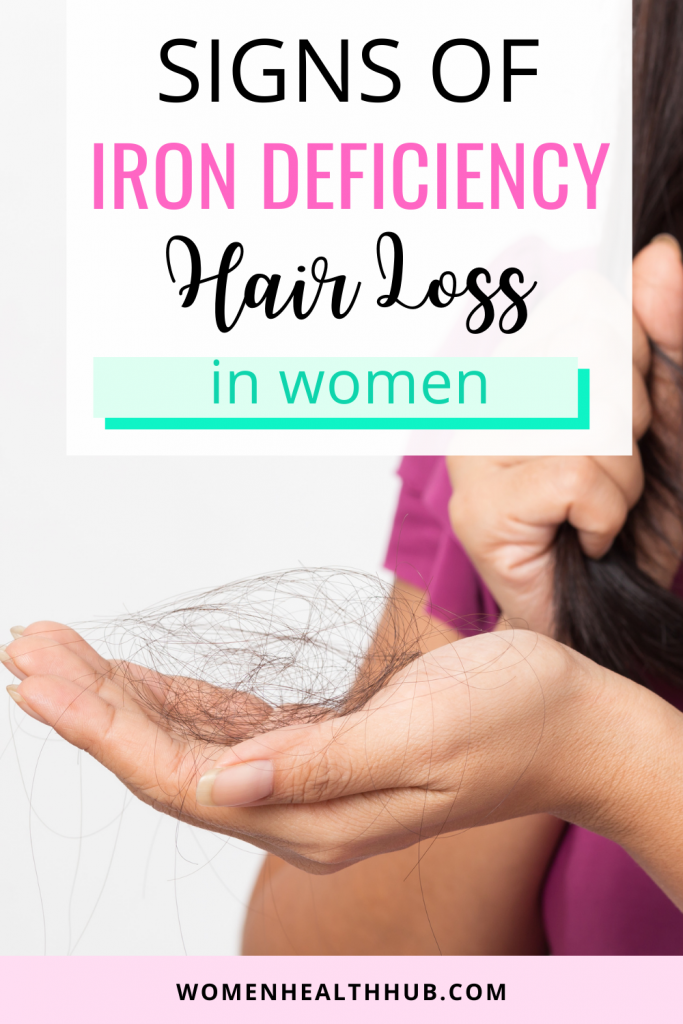
Is Iron Deficiency Hair Loss Common in Women?
Sadly, yes!
Several studies have successfully shown the connection between sudden female pattern hair loss and iron deficiency in women.
In a 2013 study published in the Journal of Korean Medical Science, scientists sought to discover the link and reason behind iron deficiency and hair loss.
They found that low iron levels in perimenopausal women (aged under 40 years) are one of the main causes of female pattern hair loss.
After analyzing blood samples of over 200 women, the results showed significantly low ferritin count in women with alopecia. Those with iron deficiency had terrible hair loss problems compared to females with ample minerals.
Additionally, a 2020 research published in Advances in Hematology, found almost 30% of iron-deficient women with severe hair loss.
A recent research further confirmed a combined vitamin and iron deficit could lead to alopecia in females.
In short, regardless of age, iron deficiency and hair loss could become a serious problem if you’re not careful about your diet and lifestyle.
Can Hormone Imbalance Lead To Iron Deficiency & Hair Loss?
In some cases, a history of hyperthyroidism or hypothyroidism can also make you susceptible to hair fall problem.
Many women with a thyroid problem experience excessive fatigue. Scientists agree that it could be because of an underlying iron deficiency. Imbalance in the thyroid hormone can also lead to iron deficiency anemia.
As a result, you’d start losing hair fast — and in bulk!
A 2015 study by S. Malkud found 180 women with significant patterned hair fall. Of them, 50% had hair loss from iron deficiency while 7% showed signs of a dysfunctional thyroid.
Even though the stats are low, thyroid hormone imbalance could also be the real culprit behind iron deficiency and hair loss.
What Does Iron Deficiency Hair Loss Look Like?
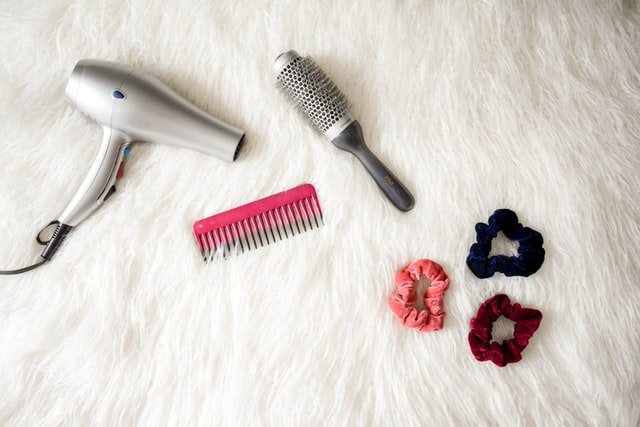
It’s important to know about the warning symptoms of iron deficiency hair loss so you can take timely action.
Just like diabetic hair fall, the biggest clue is to notice HOW MUCH & HOW OFTEN are you losing hair.
Most women experience subtle hair loss in patches. The thinning starts from the edges of head and moves toward the mid-region. This often leads to a receding hairline or bald patch smack in the middle.
Also, if you suffer hair loss in bunches – like handfuls at a time – it’s alarming.
For example, hundreds of strands coming out while taking shower or on the pillow after you wake up.
Can Your Reverse Hair Loss From Low Iron?
Losing your hair is heartbreaking. Just the thought of losing your beautiful hair is awful!
But the good news is that unlike other ruthless diseases, iron deficiency doesn’t cause permanent hair damage.
So yes, it’s possible to reverse iron deficiency hair loss naturally.
However, it might take some time. Be patient and wait. Going for quick-grow schemes might not do you any good.
Here are some useful techniques for iron deficiency hair regrowth:
- Medications:
Many doctors prescribe topical hair creams or meds to boost the process. The most popular is Minoxidil which shows results after 4 months or more.
Others might give you drugs that target enzymes responsible for hair strengthening and growth.
You might also be prescribed iron supplements to increase iron levels and initiate a natural hair loss reverse process.
- Hair transplant:
Hair transplant isn’t a primary solution and is only applicable in case your hair follicles are severely damaged.
- Cosmetic treatment:
A relatively new surgical process known as platelet-rich plasma (PRP) treatment also shows promising results for regrowing hair.
How to Prevent Iron Deficiency Hair Loss?
Preventive measures will help you avoid serious hair damage. Here are some tips to stop permanent hair loss from iron deficiency.
- Eat iron supplements regularly:
The best thing you can do to prevent iron deficiency and hair loss is to increase your iron intake. And what’s better than starting with prescribed supplements? They are fast-acting and will instantly increase blood delivery to hair follicles.
- Increase food intake with high iron:
Another excellent way to boost your iron levels is by eating lots of iron-rich foods. Make sure you’re eating sufficient green veggies such as broccoli, kale, spinach, lettuce etc. Alongside, eat more fruits including tomatoes, lemon, oranges, limes, and tangerines.
I’d also recommend eating meat but if you’re vegetarian or vegan, this could be a potential problem. Which brings me to the next point.
- Consume multivitamins:
Can’t eat meat? No worries!
Consult a dietician or nutritionist to start proper multivitamins daily. Your body also needs ample Vitamin B12 and D to ensure hair regrowth from iron deficiency.
- Quit smoking:
Are you a smoker? Tobacco could be ruining your hair health & causing low iron levels! If you’re iron deficient and have hair loss, quit smoking immediately.
- Avoid chemical products:
The one mistake that could cost you your lush beautiful hair is excessive use of harsh chemical-filled shampoos and conditioners.
Don’t fall for the marketing gimmicks. Always consult a professional first on the best iron deficiency hair regrowth options.
Read More: 7 Amazing Tips to Naturally Prevent Diabetes Hair Loss
- Don’t tighten your hair:
We all love pulling up our hair in a bun. But did you know tight ponytails could further damage the regrowth process? It’s the leading reason behind receding hairlines by pulling out the hair from its roots. Wear your hair loosely.
- Stop using heat treatments:
Finally, I’d suggest stopping all kinds of heating hair treatments. This includes the use of hair straighteners and curlers. Extreme heat might affect the iron deficiency hair loss reverse process. So avoid using styling equipment unnecessarily.
Now you know the connection between iron deficiency and hair loss. I’m sure you’ve learned quite a lot about iron deficiency hair loss and how to start hair regrowth.
Have you experienced hair loss from iron deficiency? What tips would you give to other women? Share with me in the comments. 🙂
References:
- https://www.ncbi.nlm.nih.gov/pmc/articles/PMC3685880/
- https://pubmed.ncbi.nlm.nih.gov/32792884/
- https://link.springer.com/article/10.1007/s13555-018-0278-6
- https://europepmc.org/article/PMC/4576621
